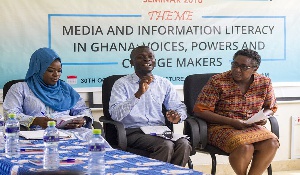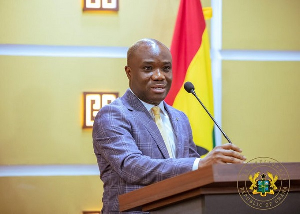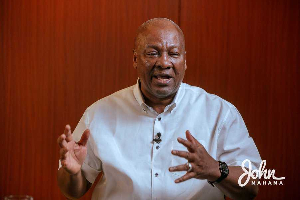The 2018 edition of the annual global Media and Information Literacy (MIL) week was marked Ghana at Institute of Journalism (GIJ) on the 30th of October, 2018 with a well attended seminar.
The seminar which had the theme, Media and information literacy in Ghana: Voices, powers and change makers brought together media practioners, Civil of Society Organisations (CSOs) and members of the acadamic community to deliberate on how to promote media and information literacy in Ghana.
MIL Week was intituted by United Nations Educational, Scientific and Cultural Organisation (UNESCO) in 2012 noticing the primary role of information and media in our everyday lives.
The Media and Information Literacy seminar which was organised by GIJ in collaboration with UNESCO-Ghana forms part of activities to celebrate the global Media and Information Literacy week in Ghana. This year, MIL week was celebrated across the world from 24th to 31st of october.
The MIL seminar at GIJ was chaired by Nana S. Achampong, Director for the Ama Ata Aidoo Center for Creative Writing. In attendance were Prof. Kwamena Kwansah-Aidoo, Rector of GIJ, Madam Linda Asante Agyei, Vice president of GJA and Madam Shamima Muslim Alhassan, Convener for Alliance for Women in Media, Africa.
The siminar was also attended by senior and junior members of faculty at GIJ including Madam Ewuradwoa Sangmoa-Tabbicca, Head of Department of Communication, Dr. Lawrencia Agyepong, Cordinator of Research and Publications and Mr. Kojo Boateng, Snr. Lecturer, GIJ.
In his welcome address Prof. Kwansah-Aidoo, Rector of GIJ recounted counted how the Ghanaian media lanscape has evolved from an era of repression and state control to the current era of freedom.
The Rector also reiterated the commitment of GIJ to the promotion of media and information literacy and called on other tertiary instutions to take a cue from GIJ’s example. “It is our hope that other institutions in the country will join us because the matter of MIL is too important to be left to only one institution to champion”, he said.
Madam Shamima Muslim Alhasan, who was part of a three member eminent pannel that deliberated on the theme of the programme stated emphatically that media and information literacy is empowerment for for a better life.
She added that although there are capacity and governance gaps which millitate against media and information literacy, these can be addressed through ‘’advocacy, policy and continous advocacy’’.
Another member of the Panel, Mr. Dominic Hlordzi, Chief Editor at the Ghana Broadcasting Corperation (GBC) called for media and information literacy to be incorporated into the curriculum of journalism training institutions and also continous training of practicing journalists on media and information literacy issues.
On her part, Madam Ewuradwoa Sangmuah-Tabbicca indicated that at GIJ, Media and Information Literacy has been incorporated in to the curriculm for both degree and diploma students, but the university can do more to promote scholarly interest in Media and Information Literacy.
This is the second time GIJ has patnered UNESCO to celebrate media and information literacy in Ghana. In 2017, the University organised a similar event which also provided a deliberative space for stakeholders towards achieving media and informtion literacy for all citizens.
Media and information literacy is crtical survival skill in our era of increased dependence on the mass communication media. Acquring approriate Media and Information Literacy competencies enables citizens to search, critically evaluate, use and contribute information and media content wisely. Empowerment of citizens through Media and Information Literacy is an important prerequisite for fostering equitable access to information and knowledge. This is also necessary for promoting free, independent and pluralistic media and information systems.
General News of Saturday, 3 November 2018
Source: Stephen Tindi

















